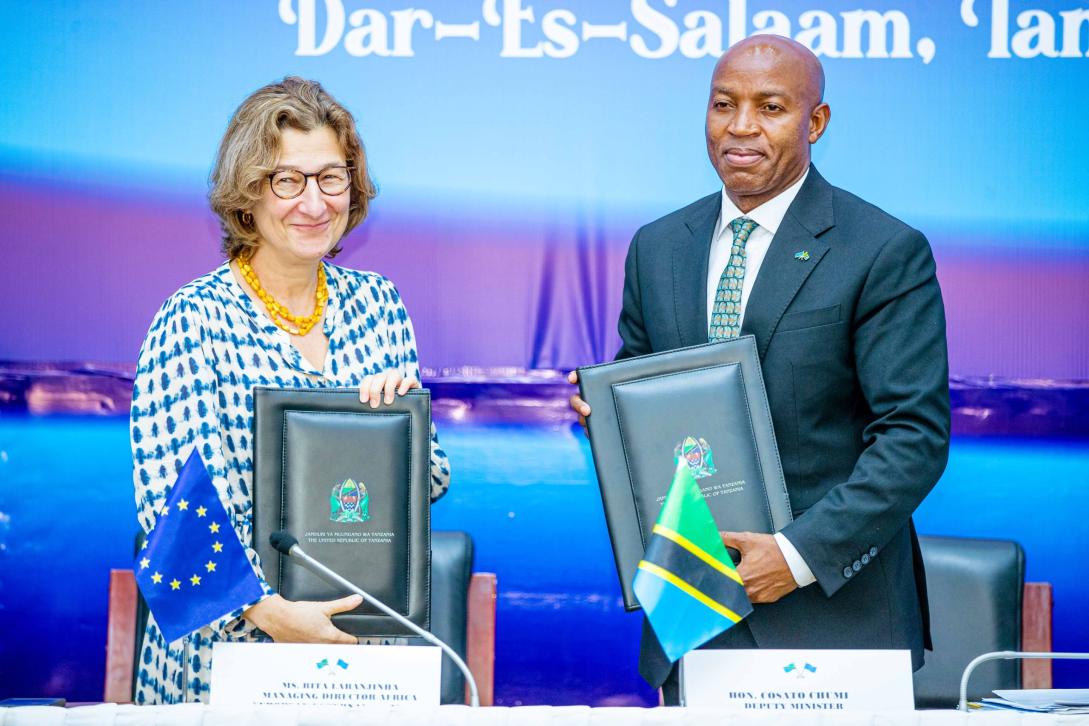Speech by Rita Laranjinha, Managing Director for Africa at the European External Action Service, delivered at the EU-Tanzania Partnership Dialogue

Ladies and gentlemen,
I am pleased to stand here today alongside my co-chair, Honourable Deputy Minister of Foreign Affairs of Tanzania, Cosatu Chumi, to address the outcomes of the Tanzania–European Union Partnership Dialogue.
I would like to express my sincere appreciation to the Government of Tanzania for their hospitality and engagement in this dialogue. The European Union values its partnership with Tanzania and congratulates the Tanzanian government and its citizens on the 63rd anniversary of Independence.
This meeting marked an important milestone in our relations, as we explored ways to deepen our cooperation and address common challenges. We believe that our cooperation has the potential to bring further mutual benefits, and we are committed to working together to achieve this goal.
We are committed to strengthening our ties in various areas, from political to economic cooperation, to security and foreign affairs. The strong presence of the EU and its Member States in Tanzania reflects the importance we attach to our relations. The presence today of EU headquarters, 14 EU Member States Ambassadors—both resident and non-resident—and the European Investment Bank is a testament to this.
We are significant investors in Tanzania, notably in sectors such as energy, tourism, agriculture, and infrastructure. Last year, EU citizens constituted the lion’s share of tourists visiting the country. In 2023, of the 400,000 tourists visiting Zanzibar, 70% came from the European Union. The EU and its Member States are also the largest private sector investors in Zanzibar.
Over the last ten years, the EU has invested an estimated EUR 3 billion (TZS 8.3 trillion) in Tanzania, generating significant jobs and tax revenue. Through budget support, the EU works with Tanzania to deliver on its national priorities.
Following the Mid-Term review of the EU’s Neighbourhood Development and International Cooperation Instrument, the United Republic of Tanzania welcomed the EU’s commitment of EUR 726 million (TZS 2 trillion) for the period 2021–2027, complemented by the EU Member States’ bilateral support of approximately EUR 1.2 billion (TZS 3.3 trillion) for 2021–2024.
For the period 2024–2027, Tanzania’s national funding will be supplemented by regional funds, opening up opportunities for significant additional investments. Tanzania is the largest recipient of EIB support in Sub-Saharan Africa.
Our discussions today were constructive and open, reflecting the strong foundation of our partnership. We acknowledged the progress made in our cooperation and identified areas where we can work together more effectively. I am pleased to say that we have made significant headway in several key areas.
1. On political relations:
On 10 December, Human Rights Day, we had an open exchange on good governance and democracy in Tanzania, including the recent elections and allegations of irregularities and a lack of a level playing field.
The EU shared its concerns regarding recent developments and reported incidents. We took note of the different contributions and welcomed the government’s commitment to address the shortcomings, engage with all stakeholders, and learn from the lessons of these incidents.
The EU hopes that both the lead-up to the general elections next year and the elections themselves will be inclusive, transparent, and credible. A level playing field for all parties will be important for free and fair elections. We welcome that civil society and regional actors will be accredited as observers for the general elections.
Both Tanzania and the European Union underlined their commitment to multilateralism and a rules-based international order underpinned by international law and the UN Charter. The EU also welcomed the strong condemnation of violence and the commitment to investigate all incidents seriously.
In addition, the EU Special Representative for Human Rights will work on visiting Tanzania early next year to engage in a dialogue on human rights issues.
2. On economic cooperation and sustainable growth:
We stressed our mutual interest in stepping up economic, trade, and investment relations and welcomed Tanzania’s willingness to address issues related to the business and investment climate.
The European Union is committed to supporting Tanzania and working at a technical level to address trade impediments when accessing the EU market.
The EU announced its funding for Tanzania for the period 2025–2027, amounting to EUR 219 million (TZS 650 billion). The EU is particularly interested in continuing to support the green transition, digitalisation, and investments in critical minerals.
We also welcomed Tanzania’s acknowledgment of Global Gateways.
3. On security:
We discussed our mutual interest in working together in this area. The European Union is already active in the region in maritime security, fighting organised crime, and improving anti-money laundering procedures. We hope to start supporting the National Counter Terrorism Centre soon.
If Tanzania is interested, further support could be provided in maritime security, combating violent extremism, and organised crime such as drug and human trafficking.
We have agreed to hold a specific security dialogue next year to identify common priority areas and strengthen our partnership in this field.
4. On global and regional developments:
We exchanged views on geopolitical matters and our willingness to cooperate more closely in multilateral settings. The EU expressed its unwavering support for international law principles, particularly in the context of Russia’s war of aggression against Ukraine.
We recognised Tanzania’s important role in maintaining peace and security in the region and noted the EU Special Representative for the Great Lakes’ interest in visiting Tanzania shortly.
Finally, we discussed our cooperation in the area of regional integration, particularly within the East African Community. The EU is a strong supporter of regional integration in Africa, as we believe it is essential for promoting economic development and stability.
The EU also took note of Tanzania’s request for support through the European Peace Facility.
In conclusion, our Partnership Dialogue has been a success, and we have made significant progress in several key areas. We are committed to strengthening our cooperation with Tanzania, as we believe it can make a real difference in the lives of Tanzanians and Europeans.
